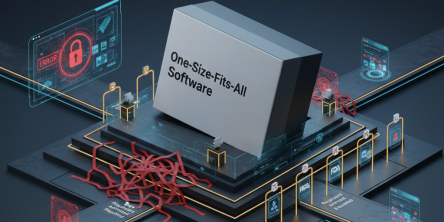Key Use Cases for Integration Platform as a Service

Integration platform as a service (iPaaS) refers to a collection of cloud-based services that are aimed at helping businesses by facilitating diverse digital integrations & across the organization. iPaaS helps connect data, facilitate data exchange, etc. Now, to help you better understand what iPaaS all is about and what it can do, allow us to walk you through some of the most popular use cases of Integration Platform as a Service.
iPaaS refers to a suite of cloud-native services that enables organizations to perform cloud-native data integration, application and API integration & data management. It is via private, public, hybrid, or multi-cloud and includes services like - data integration, application and API integration, data quality, data governance, and master data management. And, companies often use iPaaS to integrate data from different sources for analytics (e.g., applications, data warehouse sources). Further, it connects and exchanges common data between & among applications.
It can help organizations to answer questions like:
- How to build data pipelines for analytics?
- How to connect apps and integrate data in those apps?
- How to identify, fix and monitor data quality problems?
- How to exchange data externally with business partners?
- How to get a complete view of product, customer, and reference data?
- Data quality: To glean the best possible value out of data, it is imperative to ensure that the involved data is of good quality. iPaaS’s data quality provisions can help in this regard as well, thus ensuring better analytics, improved decisions, and high-quality customer experiences among other things.
- Big data integration: Another fairly popular use case for iPaaS is big data integration: big data projects necessitate the use of humongous amounts of data which must be transferred within systems ASAP. Of course, the execution of such projects, then, needs several APIs and such. Here, iPaaS can help by ensuring fuss-free management of the requisite integrations within the same platform while also simplifying various complicated integrations.
- App integration: Digital transformation is the talk of the town and with reason. Anyway, the point is that this has led more and more companies to kick off their digital transformation journeys which tend to involve modernization of the company’s existing systems as well as application integration with the latest tools and solutions to ensure seamless transfer of data amongst the systems. In this context, iPaaS offers cloud-native application and API integration to facilitate the modernization of apps and ensure they are connected to enable seamless real-time data exchange.
- Master data management: Data is currently being generated at a mind-boggling pace. This is great but the thing is that over the past two years, circumstances and customer behavior has changed massively. This is now driving the need for companies to achieve even deeper insights into customer behavior, their preferences, etc. As you can see that is a whole lot of data to be dealt with; thankfully, with iPaaS-enabled master data management, this is no problem at all. You see, master data management allows companies to manage every possible data point about customers and use it to achieve critical insights into the business's target audience and other relevant factors.
Today, the world as well as the many, many businesses within it are brimming with data — data that can transform, well, everything. This opportunity to leverage data has only grown multi-fold since the pandemic started and people became even more reliant on the digital realm for more and more of their daily tasks and lives. However, to bring to life the full potential of data, companies need avant-garde tools such as iPaaS which can help unify the siloed data and apps and thus assist with the pursuit and achievement of the company’s business goals. If you too have been struggling to make better use of your data and want to take your business to the next level, you can rest assured that iPaaS is truly the way forward.
Similar Articles
Not long ago, the idea of multiple AI agents working together, each with a specific role, collaborating to solve problems, felt like science fiction.
In today’s data-driven world, choosing the right business intelligence (BI) platform can make or break your organization's analytics success.
We all know that companies today are no longer limited to a single physical location. Work processes are also no longer strictly isolated.
It is neither secret nor news that the mind-boggling pace of digital transformation around us has totally altered consumer expectations.
In the world of finance, speed and accuracy are everything. Decisions made a day late can cost millions, and delayed visibility into financial performance can leave even the best organizations blind to risks.
Discover the best tools to enhance employee recognition, boost morale, and create a more motivated, engaged workplace culture.
At first glance, off-the-shelf software appears to be a dream come true. They are quick to set up, cheaper upfront, and marketed as “universal.”
A modern business must continually adapt. This bit everyone seems to know.
The modern healthcare industry is undergoing a significant transformation. The models of healthcare that we are used to thus far are now making way for a more data driven approach









